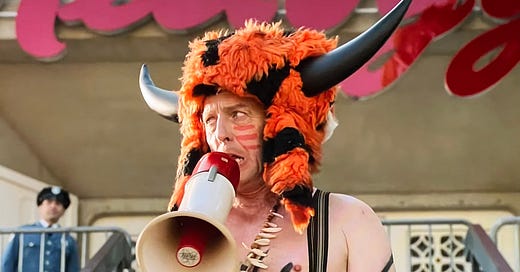It’s an Upside Down World, and You’re Living In It
Big Food, Hollywood, and the Democrats
This week, I had the distinct displeasure of watching Unfrosted. Never heard of it? Neither had I, until it popped up on Netflix and I, uncharacteristically, decided to spend an hour and a half on what seemed likely to be amusing fluff.
Unfrosted is Jerry Seinfeld’s latest project. It’s his directorial debut, and he co-wrote and starred in it, too. Seinfeld likes to complain about how “PC” everything has gotten—politically correct. Seems like a legit complaint. PC is the wording of the 90s, but still—PC, woke, same idea. In both instantiations, people are demanding ideological conformity while taking both the sanity and the humor out of life. So Seinfeld thinks the world has become PC. Comics often act as bellwethers in this regard—at the point that audiences start trying to straitjacket them into jokes that they deem appropriate, comics sound the alarm. Other than being a bit late to this particular party, I’d say he’s right.
This movie, though. This movie is a piece of work. It’s a fictionalized account of the real life feud between Kellogg and Post. Cereal giants of the 1960s, both based in Battle Creek, Michigan, Kellogg and Post competed to bring the world’s first ever “toaster pastry” to the market. Post got a product on the shelves first; they called it—I kid you not—Country Squares. Enthusiasm fizzled. Kellogg’s Pop-Tarts followed soon thereafter, and for them, enthusiasm has apparently not fizzled yet.1
I used to be a Democrat. Two of the things that I did that felt democraty include:
I bought as much of my food as possible at farmer’s markets, and got to know the farmers who grew my food. I bought organic, and avoided GMOs. When given a choice, I bought food that was grown closer to how it had been before humans got involved—cows that had spent their lives grazing outside, coffee grown in the shade on farms with canopy trees, tomatoes and strawberries picked at perfect ripeness, transported as little as possible, eaten fresh and raw.
And I refused pharmaceuticals except when absolutely necessary—the notable exception being vaccines, which I barely questioned until Covid raised my awareness. Over the counter drugs were no better. The rule of thumb in our house was: the longer it’s been on the market, the more likely it is to be safe. Aspirin seemed like a pretty safe bet, as did some antibiotics, in moderation. Everything else? Buyer beware.
I still do these things. My behavior was always informed by an evolutionary understanding of the world, a fundamental preference for solutions that have stood the test of time (e.g. beef over lab-grown meat), and wanting as little corporate product and involvement in my life as possible. Such behavior just doesn’t seem democraty anymore. It seems like the opposite.



